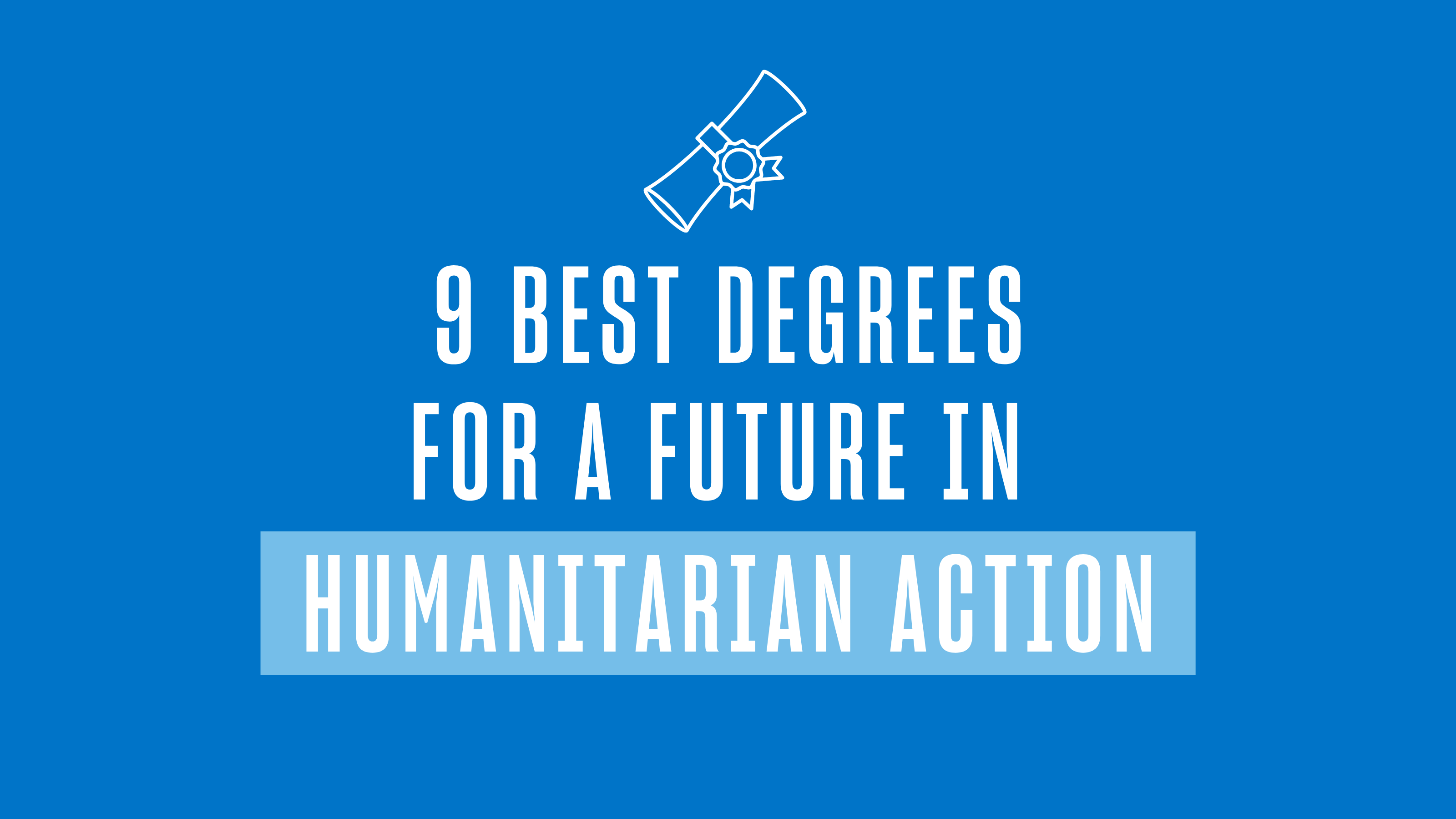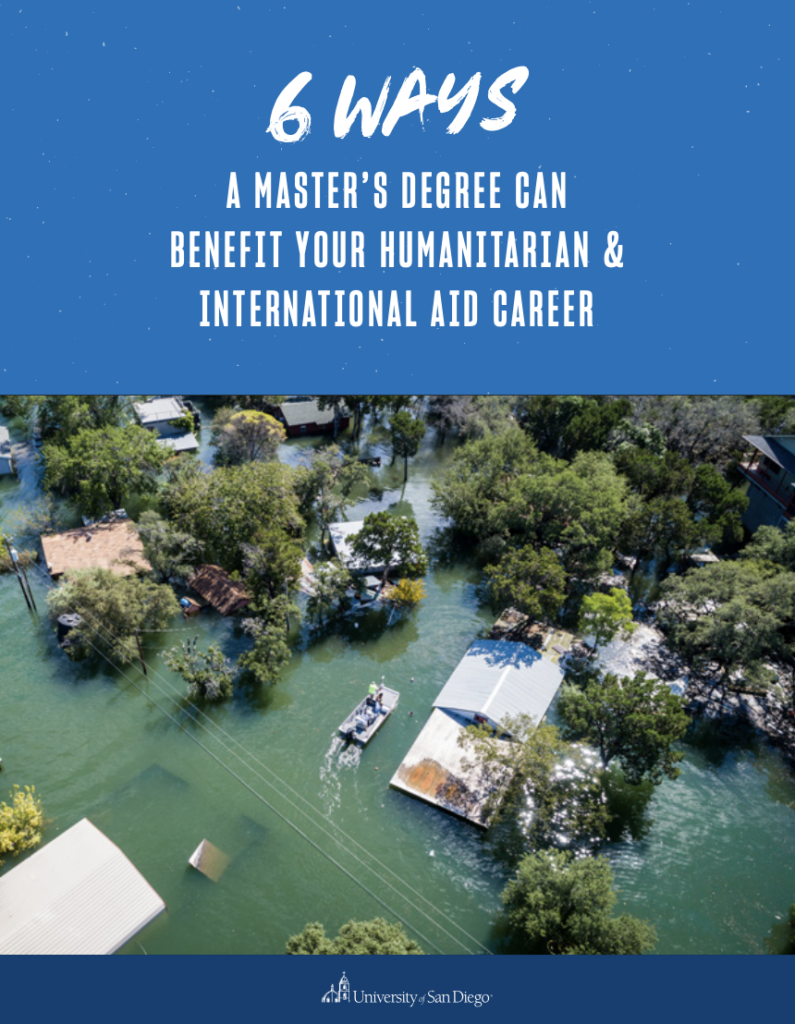When it comes to the field of humanitarian action, there is always a need for skilled leaders who are equipped with the right tools, knowledge and expertise to make a difference. If you’re considering a future in humanitarian work, there are many educational options that will provide you with the competencies you need to stand out — including a variety of undergraduate and graduate degrees.
The type of degree that’s right for you depends on many different factors, including your interests, level of education and what you want your future career to look like. To help you narrow down your options, we’ve compiled a list of the top nine degrees to consider for a career in humanitarian action.
Humanitarian Career Overview
When you picture humanitarian work, what does it look like? A common answer to this question includes first responders and other disaster relief workers delivering food, aid and shelter in times of crisis. While this image is the most popularized, there are many other positions — both on the front lines and “behind the scenes” — that contribute to a positive, impactful response.
Humanitarianism is a field that encompasses a wide range of professions and industries. Whether it’s doctors providing medical assistance, fundraisers securing much-needed donations or disaster response teams heading out into the field in the wake of natural disasters, there are multiple ways to pursue a career in humanitarian aid. Commonly associated professions include:
- Healthcare
- Communications and marketing
- Community outreach
- Engineering
- Disaster relief/response
- Emergency management and logistics
- Fundraising
- Business
- Law
For a rundown of specific career paths to consider, this list of the top 30 humanitarian careers is a great resource.
Best Degrees for Humanitarian Work
Since the field is so multifaceted, there is no shortage of ways to pursue a career in humanitarian action. However, for many, earning a degree is a common first step. But what kind of a degree is best? Generally speaking, there are two types you can choose from — undergraduate or graduate-level.
Undergraduate Degrees
This type of degree is best if you’re new to your chosen field of study or plan to extend your studies in the future, as undergraduate-level coursework is a common prerequisite for enrolling in a graduate degree program. These are the majors that lend themselves best to a career in humanitarian action:
Communications
Earning a degree in communications can be a great way to pursue a career in public relations or media (including social media) management. Both of these disciplines have places in humanitarian work since there is always a need for crafting public statements, raising awareness for particular crises or interventions and developing messaging strategies.
Economics
An economics degree provides an in-depth understanding of how markets function, how resource allocation works and the human impact of economic policies. This knowledge is especially relevant to humanitarian action since it entails working in environments where economic factors such as poverty, inequality and access to resources play a significant role.
Human Services
These programs often focus on community engagement and outreach strategies as well as advocacy and social justice principles. A career in humanitarian action involves working with local communities, mobilizing resources and speaking up for the wellbeing of vulnerable populations, making these skill sets valuable assets.
Peace and Conflict Studies
The conflict analysis and resolution techniques that this type of degree emphasizes are directly applicable to humanitarian work — especially where mediating disputes, facilitating dialogue and promoting peaceful coexistence among different groups is involved.
Social Work
A degree in social work instills specialized knowledge of human behavior, social systems and the impact that various factors have on communities. Additionally, social work programs typically include training in crisis intervention and trauma-informed care, which are important skills to have when it comes to working with communities that experience catastrophic events.
Sociology
Earning a degree in sociology is a great first step down the humanitarian career path. The reason is twofold: It imparts knowledge relating to different social structures and how they impact communities (and individuals) while emphasizing research methodologies and data analysis techniques. This concentration provides the tools to both understand social issues and evaluate possible solutions as well.
Sustainability
Environmental issues such as climate change, natural resource management and ecosystem preservation are central to sustainability degree programs. Natural disasters often act as catalysts for crises that require a humanitarian response, and having an understanding of environmental dynamics makes it easier to promote sustainable solutions.
Humanities
In addition to providing cultural and historical context for understanding current events, humanities programs — including religious studies, history, literature and languages — also spend time exploring ethical considerations and moral philosophy. The ability to examine root causes of conflicts and other cultural factors using an ethical lens helps inform effective solutions.
Disaster and Emergency Management
Humanitarian work often takes place during or directly after disasters occur. Understanding the best practices for effectively handling these types of extreme circumstances is crucial as you may be involved in coordinating and managing responses to natural disasters, conflicts and other related crises.
Additionally, if you’re interested in focusing your career on the medical side of humanitarian aid, you can prepare for medical school by earning a degree in nursing, biology, anatomy, biochemistry or psychology. Similarly, a bachelor’s in political science, social justice or international affairs can serve as a stepping stone for law school.
[RELATED] Your Guide to Becoming an Emergency Management Coordinator
Graduate Degrees
If you’ve already received an undergraduate degree in a related field and you have a firm idea of how you want your humanitarian action career to take shape, then earning a graduate-level degree could be your next step. Programs to consider include:
Humanitarian Action
This degree prepares students for a career in humanitarian assistance by focusing on general studies in emergency management and public policy, imparting the knowledge of how to best provide aid when in the field (both at home and abroad).
International Law
For those who want to bring their legal knowledge to a career in humanitarian action, a Master’s in International Law is a must. This degree equips students with a comprehensive understanding of the legal frameworks that govern humanitarian operations such as human rights law, refugee law and international criminal law.
Nonprofit Leadership and Management
Nonprofit organizations play a crucial role in the humanitarian field, often lending their support to response efforts. This Master’s program helps students build their skills in executive leadership, governance, philanthropy, fundraising and much more.
Advanced degree programs in humanitarianism tend to be all-encompassing and will introduce you to different aspects of the field. Topics covered during the course of study may include:
- Assessing human needs
- Managing complex global emergencies
- Emergency preparedness
- Humanitarian leadership
- The logistics and management of delivering aid
And while it is possible to parlay a master’s degree in a more niche field (e.g. political science, international relations, social work, etc.) into a career in humanitarian work, earning a degree in humanitarianism itself is a more direct path.
[FREE PDF] Discover the 6 Ways a Master’s Degree Can Benefit Your Humanitarian and International Aid Career
Choosing Your Humanitarian Degree
Ultimately, the degree you decide to pursue will depend on your career goals and where your interests lie. The humanitarian field is multi-dimensional and encompasses many different professions, so no matter what you choose to specialize in, your unique skill set can make a difference.
Are you ready to make a lasting impact as a humanitarian leader? The online Master of Science in Humanitarian Action from the Kroc School of Peace Studies at the University of San Diego cultivates the skills and knowledge needed to help prevent, respond to and recover from complex global humanitarian emergencies.
Download your copy of our free eBook, 6 Ways a Masters Degree Can Benefit Your Humanitarian and International Aid Career, to find out more about how a master’s degree program can provide you with the experience and knowledge you need to take the next step in your career.





![What Makes a Good Humanitarian [+ Important Skills]](https://onlinedegrees.sandiego.edu/wp-content/uploads/2023/12/MSHA_Blog_GoodHumanitarian-1024x576.png)